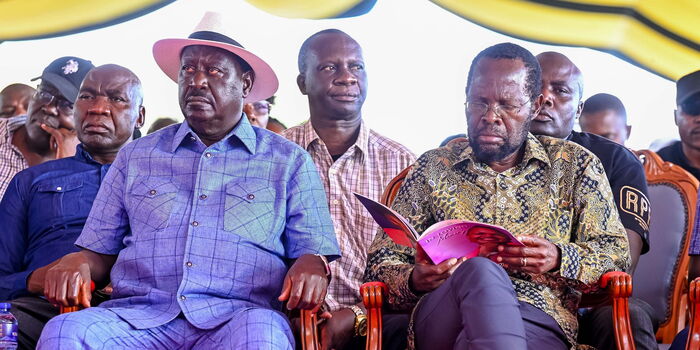President William Ruto’s recent executive order, which removes the vetting requirement for certain citizens from border counties in the Northeastern region to obtain identification documents, has sparked heated reactions.
Among those responding strongly to the directive are members of the Orange Democratic Movement (ODM), a party that has recently aligned with Ruto on some matters.
On Sunday, ODM’s interim party leader, Peter Anyang’ Nyong’o, directed all party-affiliated Members of Parliament (MPs) to address the issue in Parliament once sessions resume on Tuesday.
This directive signals growing opposition to Ruto’s order from within the political space, particularly from leaders who believe the move has significant implications.
Speaking during an ODM Western Region convention, Nyong’o argued that the new directive threatens the rights and freedoms of citizens residing in border counties. He strongly opposed any attempt to interfere with citizenship matters, saying that such actions are unconstitutional.
“No one, not even the President, should imagine that they can introduce laws restricting movement across the borders in a way that limits the freedom and protection of people living in these counties,” Nyong’o stated.
He further instructed ODM MPs to make it clear in Parliament that any effort by individuals—without mentioning names—to create confusion around citizenship in border counties is unacceptable.
“We know these counties belong to us as Kenyans. Any action that complicates citizenship issues in border counties is unconstitutional and should be opposed,” he emphasized.
Nyong’o criticized President Ruto for making the decision without consulting the county governments, arguing that such a directive should have involved discussions with the devolved units.
“According to our Constitution, we have 48 governments in this country—one national government and 47 county governments. Major decisions like this should not be made unilaterally,” he added.
ODM leaders are not the only ones raising concerns. Trans Nzoia Governor George Natembeya also criticized the executive order, warning that it could pose a serious security threat to the country.
He cautioned that the policy change might allow individuals linked to outlawed terror groups to gain Kenyan identification documents and even infiltrate leadership positions.
“This is a major security risk. If not handled carefully, we may soon find ourselves in a situation where even elected officials, such as MCAs, come from outlawed groups,” Natembeya warned.
Despite the strong opposition, Ruto’s allies have defended the President’s decision. Over the weekend, Majority Leader Kimani Ichung’wah dismissed those opposing the move, accusing them of fueling tribal divisions.
As the debate continues, all eyes will be on Parliament next week to see how ODM legislators push back against the executive order and whether the government will reconsider its position on the matter.
Join Gen z and millennials TaskForce official 2025 WhatsApp Channel To Stay Updated On time the ongoing situation https://whatsapp.com/channel/0029VaWT5gSGufImU8R0DO30


